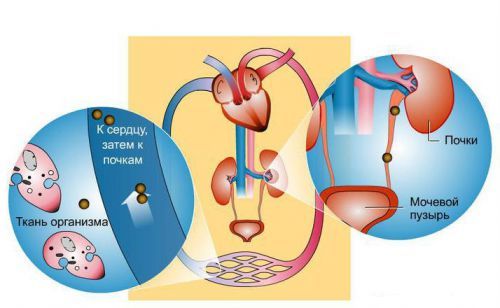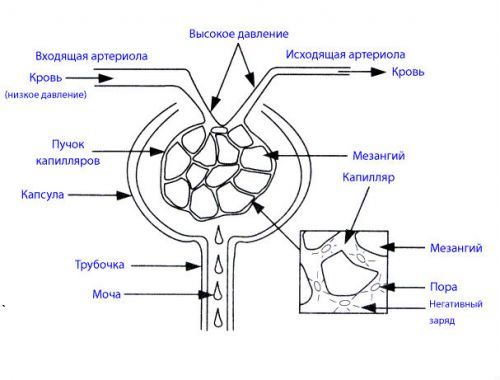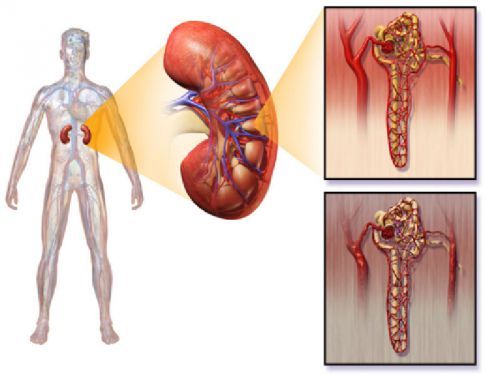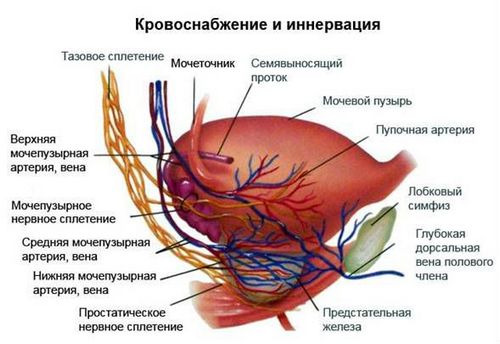The kidneys, ureters, bladder, urethra, male genitals and prostate, are the urinary system, which aims to develop, accumulation and excretion of urine. The main role in this system perform the kidneys. Filtering blood in the kidneys occurs with many renal corpuscles and tubules (nephrons).
Renal function
Each kidney is non-stop filter, which in an adult handles about 1.2 liters of blood per minute.
The kidneys perform the following functions:
- in them, the process of urine formation;
- blood purification, and withdrawal of drugs, toxins, etc.;
- regulate the exchange of electrolytes;
- control the pressure and volume of blood circulation;
- support the acid-alkaline balance.
The kidneys perform vital functions in the human body

Due to the nephrons in the kidney following processes.
Filtering
The filtration process in the kidney begins with the straining of blood through the glomerular membrane under the influence of hydrostatic pressure. Resulting in the loss of large amounts of liquid, useful chemicals and toxins. Filtered from the blood substances (primary urine) is moved in the capsule of Bowman. Primary urine is composed of water, excess salts, glucose, urea, creatinine, amino acids and other low molecular weight compounds.
The filtration rate of the kidney – its main characteristic, which affects the efficient operation of the body and overall health.
The rate of formation of primary urine is 110 ml / min in the female body and 125 men. These are average figures which can vary depending on weight, age and other physical characteristics of a person.
During the day formed 180 l primary urine.
Reabsorption
In the process of reabsorption is the absorption of epithelial cells water, glucose, nutrients, and returning them to the blood.
At this stage the blood is returned 178 l or 99% of the components of the primary urine. Threshold substances are absorbed to a certain concentration in the blood (e.g., glucose), non-threshold – fully (e.g., proteins).
Secretion
At this stage, the secretion of hydrogen ions (H+), potassium ions (K+), ammonia, and certain drugs. The processes of secretion and reabsorption, in which the primary urine is converted into the secondary volume of 1.5 to 2 liters per day.
Violation of the filtration process in the kidneys
Kidney pressure and its symptoms

The filtration ability of the kidneys is determined using a number of purification – clearance. It can determine the speed of blood purification by the kidneys from a certain substance in 1 minute. Specialists use of endogenous substances (endogenous creatinine clearance) and exogenous substances (inulin). Also need details about the content of the milligrams-percent of the substance in the blood plasma (A) and urine (M) and minute diuresis (D) is the volume of urine excreted by the body within 1 minute.
Then use the formula: C=M/K x D ml/min.
This method gives identify reduced or increased filtration of the kidneys.
Symptoms of disturbed filtration process
Violations of the filter in the manifest:
- reduced pressure;
- renal failure;
- giperatidnosti (especially limbs and face);
- disturbed urination (bladder emptying occurs too often or, on the contrary, rarely).
- change the color of urine;
- pain syndrome in the lumbar spine.
Causes disorders of filtration of the kidneys
Violation of the filtration capacity of the kidneys is causes, which are divided into 2 types:
- The pathology due to the presence of serious chronic diseases that do not directly affect the urinary system. These include: shock, dehydration, purulent-inflammatory processes, different pressure in different areas in the circulatory system, etc.
- Normally the kidneys cease to filter if pathology, for example: reduced surface area of the glomeruli, reduced blood flow to the kidneys, the damaged glomerular membrane, and the obstruction of the tubules. Such changes lead to the polycystic, pyelonephritis and other diseases.

The filtering glomeruli of the kidney
Reduced filtering of the kidneys
Reduction of filtration of the kidneys is characterized by insufficient formation of primary urine and is caused by:
- a low blood pressure. To this state result in a state of shock and heart failure, which leads to a decrease in hydrostatic pressure in the glomeruli and, as a consequence, disruption of the filtration process. Cardiac decompensation leads to stagnation in the kidney, resulting in increased intrarenal pressure and decreases filtration. However, kidneys have the ability to automatically adjust blood flow and the negative pressure in full may not affect the operation of the authority;
- narrowed renal artery and arterioles (atherosclerotic stenosis). As a result of this pathological condition is decreased renal blood flow and decreases the hydrostatic pressure in the glomeruli. A strong increase in pressure occurs when the arterioles are bringing increased tone (during reflex anuria pain, the introduction of a large dose of adrenaline, hypertonic disease);
- increased oncotic pressure of blood as a result of dehydration or injection of drugs based on protein in the blood contribute to a drop in filtration pressure, and the result is a bad renal filtration;
- violated the outflow of urine occurs when kidney disease, prostatic hypertrophy and other diseases and contributes to the progressive increase in intrarenal pressure. When reaching 40 mm Hg. article, there is a risk of a complete cessation of filtration, followed by anuria and uremia;
- reduced the number of employees of the glomeruli is seen in chronic nephritis, nephrosclerosis. As a result, the filtration area is limited and the primary urine is formed in smaller amounts. These changes may indicate damage to the filter membrane and contribute to the emergence of uremia;
- damaged filtering membrane is a violation of the filter body.
Filtering blood in the kidneys occurs is slowed down most often in heart failure, hypotension, and presence of tumors, which contribute to lowering of pressure in the kidney and contributes to renal failure.
Increased filtration of the kidneys
To this pathological condition result:
- the increased tone of deferent arterioles, which occurs when the ingestion of small doses of adrenalin, in the initial stages of nephritis or hypertension;
- reduced tone of arterioles leading may reflex with a limited blood flow external part of the body (for example: fever leads to increased urine output temperature rise);
- reduced oncotic pressure of the blood due to heavy fluid or blood thinners.
Increased filtration is also observed in lupus erythematosus and diabetes mellitus, resulting in increased diuresis, resulting in the body loses essential amino acids, glucose and other substances.

Diabetes is one of the reasons of violation of the filtration of the kidneys
Treatment broken blood filtration
The scheme of treatment of a pathological condition is determined individually by a nephrologist according to the patient’s condition and underlying disease with which it is necessary to fight.
The most commonly prescribed and specialist medicines, Theobromine and Aminophylline, which are diuretics and can improve the filtration of the kidneys.
Treatment also includes diet. It is necessary to exclude from the diet of fatty, fried, salty and spicy food. Protein intake should also be limited. Recommended boiled, stewed or steamed dishes. These limitations are relevant in the treatment and prophylactic purposes.
Diet is of great importance in the treatment of disorders of filtration of the kidneys
Drinking regime should be increased to 1.2 liters of fluid per day. The exception may be the presence of edema.
To normalize the function of the kidneys are folk remedies.
Well watermelon diet, diuretic decoctions and herbal infusions, teas:
- parsley (1 tbsp. spoon roots and seeds) pour boiling water (0.5 l), to instruct for several hours. To drink half a Cup 2 times a day;
- root, rosehip (2 tablespoons roots), pour boiling water, boil 15 minutes to Drink 1/3 Cup three times a day.
You should also give up alcohol, avoid stress, relax and to take the necessary measures to boost immunity.
Self-treatment is strictly prohibited. Only timely diagnosis and treatment of disease and concomitant diseases with the help of professionals can lead to positive results.



